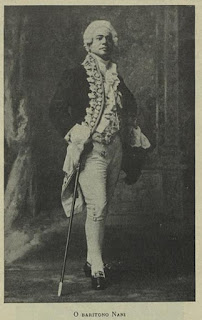Her real name Maria
Kempner was shortened to "Ivogün" after the maiden name of her
mother, the operetta singer I (da) vo (n) Gün (ther); her father, Pál Kempner,
was an Austro-Hungarian officer; she was not related to the soprano Mizzi
Günther, who created Lehár's "Lustige Witwe". She was trained by
Irene Schlemmer-Ambros in Vienna. Bruno Walter recognized her outstanding
talent and engaged her for his new workplace at the Court Opera in Munich. She
gave her debut in Munich in the role of Mimi in Puccini's "La
bohème". From 1913 to 1925 she worked as a highly valued prima donna at
the Court Opera in Munich; Here she sang the part of Ighino in the world
premiere of Hans Pfitzner's "Palestrina" on June 12th, 1917, and in
1918 the title role in "Das Christelflein" by the same composer in a
new version of the opera. In Munich she continued to work in the world
premieres of the operas "Der Ring des Polykrates" by Korngold (March
28, 1916) and "Die Vögel" (December 4, 1920) by Walter Braunfels. In
1916 and 1919 she made guest appearances at the Berlin Court Opera and the
Berlin State Opera, in 1917 at the Dresden Court Opera, in the 1916-1919 at the
City Theater of Zurich, in 1919 and 1932 at the City Theater of Basel. From
1921 to 1932 she was married to the tenor Karl Erb (1877-1958), and from 1933
to the pianist and song accompanist Michael Raucheisen (1889-1984). Since 1925
she has belonged to the ensemble of the Berliner Städtische Oper. She made
guest appearances at the Covent Garden Opera in London (1924 as Zerbinetta in
"Ariadne auf Naxos", one of her great creations, and as Gilda in
"Rigoletto", in 1927 as Konstanze in "Entführung aus dem
Serail") at La Scala in Milan, brilliant successes at the Vienna State
Opera and at the Berlin State Opera. In 1922 she undertook a very successful
concert tour through the USA, in 1923 she toured North America as a guest
artist with the German Opera Company; she was heard in New York as Frau Fluth
in Nicolai's "Lustige Weibern von Windsor". From 1922 to 1923 she sang
at the Chicago Opera and made guest appearances with their ensemble in 1926 at
the Metropolitan Opera in New York as Rosina in "Barbiere di
Siviglia". (However, she did not become a member of this House). At the
Salzburg Festival in 1925 and 1930 she was seen as Norina in "Don
Pasquale" as well as at recitals and concerts. As a concert singer she
also appeared in Budapest (1926, 1933), Paris (1931), Amsterdam (1932, 1933),
Oslo (1922), Copenhagen (1932) and in Spain. She was famous as an operetta
singer and as an interpreter of coloratura waltzes and canzons. When she made
her debut, she had decided to sing for twenty years and not a day longer, which
she then did. So she gave up her career in 1932, but sang Zerbinetta again in
Berlin in 1934. In 1948 she received a professorship at the Vienna Music
Academy, and in 1950 at the Berlin Music Academy. Her students included the
famous sopranos Elisabeth Schwarzkopf, Rita Streich, Renate Holm, Michi Tanaka
and Alexandra Trianti. She spent her twilight years in Beatenberg, where she
died very old.

























